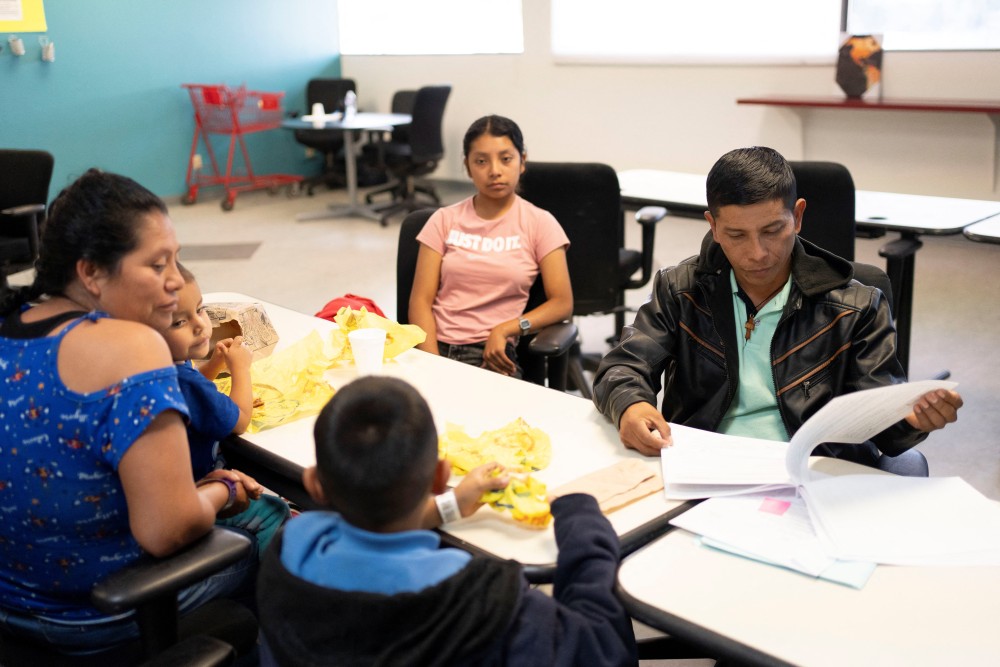
By Gina Christian
(OSV News) — A federal judge has halted an immigration policy offering protections for non-citizen spouses and stepchildren of U.S. citizens intended to keep their families together as they seek to legalize their status in the United States.
U.S. District Judge Judge J. Campbell Barker issued an Aug. 26 administrative stay against the Biden administration’s “Keeping Families Together” rule, which had been challenged by 16 states, including Texas.
The 14-day stay, which can be extended, “does not apply to the agency’s creation of a process for seeking parole in place under the rule, as opposed to the granting of parole in place under the rule,” wrote Barker in his order.
Announced June 18, the Biden administration’s rule sought to allow mixed-status families to remain united by helping qualified non-citizen spouses and children apply for lawful permanent residence without first leaving the U.S.
Applicants for the “parole in place” plan had to have resided in the U.S. for 10 or more years and be legally married to a U.S. citizen. Those approved by the Department of Homeland Security would have been permitted to remain in the U.S., with a three-year period — during which they could obtain work authorization — to apply for permanent residency.
In a June 18 statement, the White House said the rule was set to benefit “approximately half a million spouses of U.S. citizens, and approximately 50,000 noncitizen children under the age of 21 whose parent is married to a U.S. citizen.”
On average, those eligible “have resided in the U.S. for 23 years,” the White House noted.
Days after DHS had begun accepting applications, the coalition of states filed their challenges in U.S. District Court in the Eastern District of Texas, calling the Biden program “unlawful.”
“Longstanding federal law prohibits aliens who entered the United States unlawfully from obtaining most immigration benefits. This includes obtaining lawful permanent resident Status — without first leaving the United States and waiting outside the United States for the requisite time — based on an approved family-based or employment-based visa petition,” said the states in their filing.
The states said those provisions “serve as powerful disincentives for individuals to cross the border unlawfully.”
Anna Gallagher, executive director of the Catholic Legal Immigration Network Inc., known as CLINIC, called Barker’s order “deeply disappointing and a setback for families across the nation.
“The Keeping Families Together program is a compassionate and practical solution that allows families to stay together as they navigate family-based immigration legal processes,” Gallagher said in a statement emailed to OSV News. “At CLINIC, we remain committed to advocating for policies that promote family unity and uphold the values of justice and human dignity. We will continue to support those affected by this decision and advocate for pathways to citizenship that will keep families together.”
Earlier, Bishop Mark J. Seitz of El Paso, Texas — who serves as chairman of the U.S. Conference of Catholic Bishops’ Committee on Migration — had welcomed the Biden administration rule, noting that a similar program had been available to military service members and their families for a number of years.
In a June 18 statement, Bishop Seitz said, “We’ve seen the positive impacts such programs can have, not only for beneficiaries themselves but for the families, employers, and communities that rely on them,” adding that the new program was “sure to yield similar benefits.”
Bishop Seitz also said in his statement that “legislators have a moral and patriotic duty to improve our legal immigration system, including the opportunities available for family reunification and preservation.
“A society is only as strong as its families, and family unity is a fundamental right,” he said. “For the good of the country, Congress must find a way to overcome partisan divisions and enact immigration reform that includes an earned legalization program for longtime undocumented residents.”
